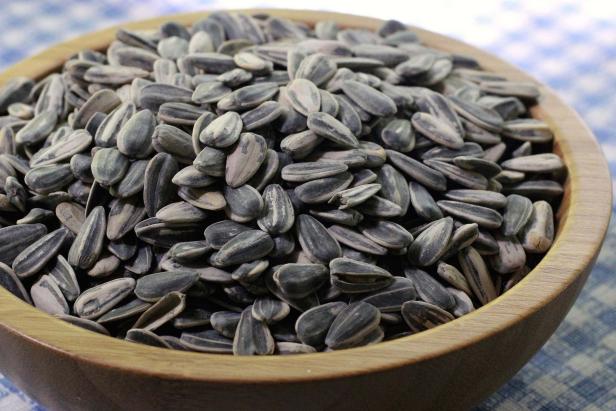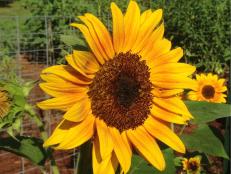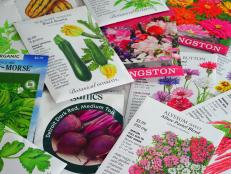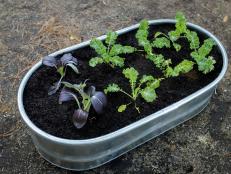Sunflower Seeds: Nutrition and Health Benefits

Harvest sunflower seeds for a nutritious snack straight from the back yard.
Try your hand at growing sunflower seeds, a tasty snack that blends a satisfying crunch with nutritional value. Some have claimed sunflower seeds’ reputed health benefits can encompass everything from possible help in fighting disease, to lowering cholesterol, to reducing asthma. They’re also super versatile in the kitchen, taste great solo or mixed with salads, veggies, fruits or homemade breads. Best of all, these tiny, health-promoting seeds are ones you can easily grow yourself.
Sunflower seeds’ nutrition starts with protein. Roasted or raw, sunflower seeds contain nearly 25 percent protein. A 1-ounce serving of hulled seeds dishes up 5 grams of protein, making sunflower seeds a healthy snack in a weight loss or workout plan. That same ounce of seeds serves 14 grams of fat, but 93 percent of that fat is the good kind—the kind that helps remove and prevent plaque in blood vessels. That means that sunflower seeds’ health benefits might help in fighting stroke and heart attack.
The fat in sunflower seeds is comprised of monounsaturated and polyunsaturated fatty acids. Sunflower seeds also are high in vitamin E, which can act as an anti-inflammatory. This means that sunflower seeds’ potential health benefits might extend to reducing symptoms of inflammatory-based disease, such as asthma, gastric ulcers and arthritis.
Sunflower seeds boast strong mineral content, including magnesium, calcium and copper. All of these help in building healthy bones, and magnesium also plays a role in lowering high blood pressure and preventing migraine headaches. These nutty seeds are also rich in selenium, serving 32 percent of the recommended daily amount in 1 ounce. An antioxidant, some claim that selenium can help in anti-aging and in fighting disease.
Sunflower seeds’ nutrition includes B-complex vitamins, such as folate (B-9). One ounce of sunflower seeds serves 17 percent of the daily recommended intake of folate. You’ll take in 20 percent of the recommended daily amount of B-5, also known as pantothenic acid, when you munch 1 ounce of sunflower seeds. This B-vitamin is said to reduce stress, energize the body and fight insomnia and arthritis.
You can raise your own sunflower seeds without too much fuss. The hardest part about the whole process is harvesting sunflower seeds before birds and squirrels get them. Sunflower seeds are usually ready about three months after planting. Flower heads start to droop as seeds are ripening. When the back of the flower disk turns brown or black, seeds are ready for harvest.
Cover ripening sunflower seeds with cheesecloth to keep critters from stealing your harvest and to catch any ripe seeds that may fall from the flower. Cut seedheads with at least 1 foot of stalk attached. Hang them upside down in a well-ventilated place. Cover flower heads with a paper bag (punch holes in it for air flow) or cheesecloth to catch seeds that ripen and fall.
Store seeds in containers that permit air flow. If sunflower seeds aren’t dry enough and you place them in airtight containers, they’ll mold.
Editor's Note: This article is not intended as medical advice. Always consult a professional healthcare provider before trying any form of therapy or if you have any questions or concerns about a medical condition. The use of natural products can be toxic if misused, and even when suitably used, certain individuals could have adverse reactions.














































